
The speaker of the United States House of Representatives, commonly known as the speaker of the House or House speaker, is the presiding officer of the United States House of Representatives. The office was established in 1789 by Article I, Section II, of the U.S. Constitution. By custom and House rules, the speaker is the political and parliamentary leader of the House and is simultaneously its presiding officer, de facto leader of the body's majority party, and the institution's administrative head. Speakers also perform various other administrative and procedural functions. Given these several roles and responsibilities, the speaker usually does not personally preside over debates—that duty is instead delegated to members of the House from the majority party—nor regularly participate in floor debates.
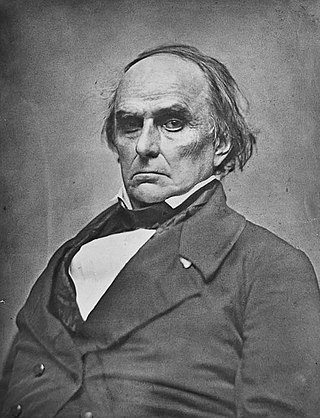
Daniel Webster was an American lawyer, statesman, and diplomat and represented New Hampshire and Massachusetts in the U.S. Congress and served as the 14th and 19th U.S. secretary of state under presidents William Henry Harrison, John Tyler, and Millard Fillmore. Webster was one of the most prominent American lawyers of the 19th century, arguing over 200 cases before the United States Supreme Court in his career. During his life, Webster had been a member of the Federalist Party, the National Republican Party, and the Whig Party. He was among the three members of the Great Triumvirate along with Henry Clay and John C. Calhoun.

Newton Leroy Gingrich is an American politician and author who served as the 50th speaker of the United States House of Representatives from 1995 to 1999. A member of the Republican Party, he was the U.S. representative for Georgia's 6th congressional district serving north Atlanta and nearby areas from 1979 until his resignation in 1999. In 2012, Gingrich unsuccessfully ran for the Republican nomination for president of the United States.

James Claude Wright Jr. was an American politician who served as the 48th speaker of the United States House of Representatives from 1987 to 1989. He represented Texas' 12th congressional district as a Democrat from 1955 to 1989.
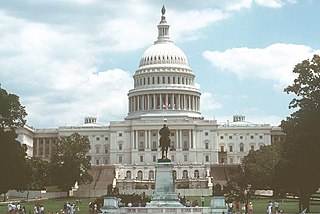
The 101st United States Congress was a meeting of the legislative branch of the United States federal government, composed of the United States Senate and the United States House of Representatives. It met in Washington, D.C., from January 3, 1989, to January 3, 1991, during the final weeks of Ronald Reagan's presidency and the first two years of George H. W. Bush's presidency.
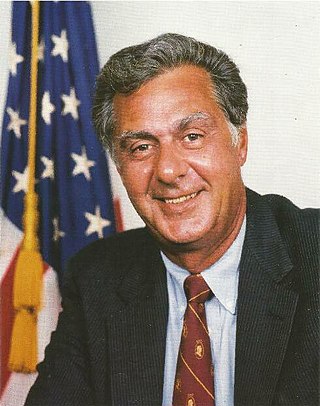
Richard Keith Armey is an American economist and politician. He was a U.S. Representative from Texas's 26th congressional district (1985–2003) and House Majority Leader (1995–2003). He was one of the engineers of the "Republican Revolution" of the 1990s, in which Republicans were elected to majorities of both houses of Congress for the first time in four decades. Armey was one of the chief authors of the Contract with America. Armey is also an author and former economics professor. After his retirement from Congress, he has worked as a consultant, advisor, and lobbyist.
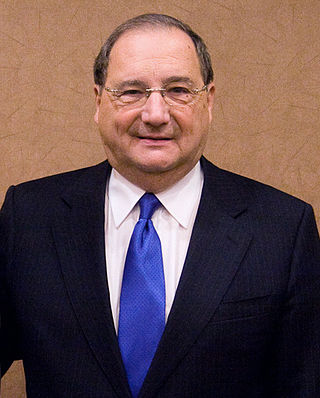
Abraham Henry Foxman is an American lawyer and activist. He served as the national director of the Anti-Defamation League (ADL) from 1987 to 2015, and is currently the League's national director emeritus. From 2016 to 2021 he served as vice chair of the board of trustees at the Museum of Jewish Heritage in New York City in order to lead its efforts on antisemitism.
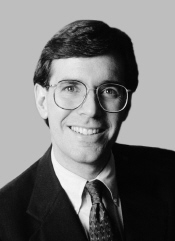
Leon William Paxon is an American lobbyist and former member of the United States House of Representatives from New York. From 1989 to 1999, he served five terms in Congress.
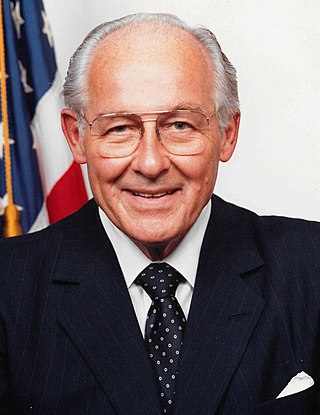
Robert Henry Michel was an American Republican Party politician who was a member of the United States House of Representatives for 38 years. He represented central Illinois' 18th congressional district, and was the GOP leader in the House, serving as House Minority Leader during his last 14 years in Congress (1981–1995).

Robert Vincent Remini was an American historian and a professor emeritus at the University of Illinois at Chicago. He wrote numerous books about President Andrew Jackson and the Jacksonian era, most notably a three-volume biography of Jackson. For the third volume of Andrew Jackson, subtitled The Course of American Democracy, 1833-1845, he won the 1984 U.S. National Book Award for Nonfiction. Remini was widely praised for his meticulous research on Jackson and thorough knowledge of him. His books portrayed Jackson in a mostly favorable light and he was sometimes criticized for being too partial towards his subject.

The United States House of Representatives, commonly known as the lower chamber of the United States Congress, along with the United States Senate, commonly known as the upper chamber, are the two parts of the legislative branch of the federal government of the United States. Like its counterpart, the House was established by the United States Constitution and convened for its first meeting on March 4, 1789, at Federal Hall in New York City. The history of this institution begins several years prior to that date, at the dawn of the American Revolutionary War.

Hazel Abel was an American educator and politician in the U.S. state of Nebraska, who served as a member of the United States Senate for fifty-four days in 1954. She was the second woman elected to the Senate from Nebraska, and she remains the shortest-serving senator from Nebraska.

The House Democratic Caucus is a congressional caucus composed of all Democratic representatives in the United States House of Representatives, voting and non-voting, and is responsible for nominating and electing the Democratic Party leadership in the chamber. In its roles as a party conference, the caucus writes and enforces rules of conduct and discipline for its members, approves committee assignments, and serves as the primary forum for development of party policy and legislative priorities. It hosts weekly meetings for these purposes and to communicate the party's message to members.
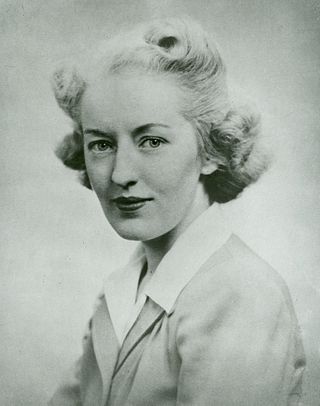
Winifred Claire Stanley was an American politician and attorney from New York affiliated with the Republican Party. Stanley is known for her vigorous women's rights advocacy during the WWII war time period, her work as a prosecutor, and for being the first female assistant district attorney in Erie County. Although Stanley served only one term before her constituency was redistricted, she used her legislative standing to champion peacetime demobilization and equal pay regardless of sex.
Raymond W. Smock is an American historian, who is the director emeritus of the Robert C. Byrd Center for Congressional History and Education at Shepherd University, and formerly the Historian of the United States House of Representatives (1983–1995).

The United States House of Representatives is the lower chamber of the United States Congress, with the Senate being the upper chamber. Together, they compose the national bicameral legislature of the United States. The House is charged with the passage of federal legislation, known as bills; those that are also passed by the Senate are sent to the president for signature or veto. The House's exclusive powers include initiating all revenue bills, impeaching federal officers, and electing the president if no candidate receives a majority of votes in the Electoral College.

The Office of the Special Envoy to Monitor and Combat Antisemitism is an office of the Under Secretary for Civilian Security, Democracy, and Human Rights at the United States Department of State. The office "advances U.S. foreign policy on antisemitism" by developing and implementing policies and projects to support efforts to combat antisemitism.

Matthew A. Wasniewski is an American historian who has served as the fourth Historian of the United States House of Representatives since 2010. Wasniewski had served as a historian within the House Clerk's Office of History and Preservation prior to his appointment.
Christina Jeffrey is an American political scientist who briefly served as Historian of the United States House of Representatives.

















